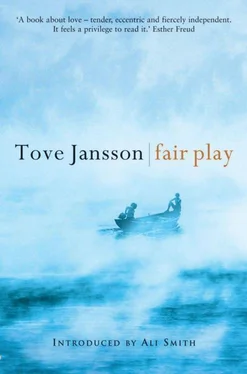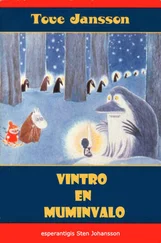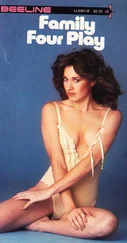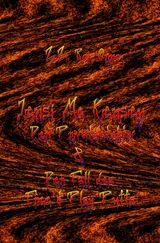And now came the day in November when everything in Mari’s studio was to be rehung, rearranged, renewed, and given a completely new significance — graphics, paintings, photographs, children’s drawings, and all sorts of precious small objects reverently pinned up on the walls, which as time passed had lost all memory and meaning. Mari had assembled hammer, nails, picture hooks, steel wire, a level, and several other tools. Jonna had brought only a tape measure.
She said, “We’ll start with the wall of honour. Naturally, that will stay strictly symmetrical. But your grandfather and grandmother are too far apart, and for that matter it can rain in on your grandfather through the stovepipe. And your mother’s little wash drawing gets lost; it needs to be higher. That pretty mirror is idiotic, it doesn’t belong, we have to keep it austere. The sword’s okay, if a little pathetic. Here, measure — it’ll be seven, or six and a half. Give me the awl.”
Mari gave her the awl and saw how the wall regained a balance that was no longer traditional but instead almost provocative.
“Now,” said Jonna. “Now we’ll remove these little curiosities you don’t really care about. Free up the walls. This will be an exhibition without a lot of knickknacks all over the place. Put them in one of your seashell boxes or send them to some children’s museum.”
Mari thought quickly about whether she should be offended or relieved, couldn’t decide, and said nothing. Jonna moved on, took pictures down and put them back up, her hammer blows inaugurating a new era.
“I know,” she said, “rejection’s not easy. But you reject words, whole pages, long impossible stories, and it feels good once it’s done. It’s no different rejecting pictures, a picture’s right to hang on a wall. And most of these have hung here too long; you don’t even see them any more. The best stuff you have, you don’t see any more. And they kill each other because they’re badly hung. Look, here’s a thing of mine and here’s your drawing, and they clash. We need distance, it’s essential. And different periods need distance to set them apart — unless you’re just cramming them together for the shock effect! You simply have to feel it… There should be an element of surprise when people’s eyes move across a wall covered with pictures. We don’t want to make it too easy for them. Let them catch their breath and look again because they can’t help it. Make them think, make them mad, even… Now we’ll give our colleagues here better light. Why did you leave so much space right here?”
“I don’t know,” Mari said. But she did know. Suddenly she knew very well that deep down she didn’t like the painter colleagues who had done these undeniably very fine works. Mari began paying attention. As she watched Jonna rehang the pictures, it seemed to her that lots of things, including their life together, fell into perspective and into place, a summary expressed in distance or self-evident clustering. The room had changed completely.
When Jonna had taken her tape home with her, Mari marvelled all evening at how easy it is in the end to understand the simplest things.
THEY LIVED AT OPPOSITE ENDS OF A LARGE APARTMENT building near the harbour, and between their studios lay the attic, an impersonal no-man’s-land of tall corridors with locked plank doors on either side. Mari liked wandering across the attic; it drew a necessary, neutral interval between their domains. She could pause on the way to listen to the rain on the metal roof, look out across the city as it lit its lights, or just linger for the pleasure of it.
They never asked, “Were you able to work today?” Maybe they had, twenty or thirty years earlier, but they’d gradually learned not to. There are empty spaces that must be respected — those often long periods when a person can’t see the pictures or find the words and needs to be left alone.
When Mari came in, Jonna was on a ladder building shelves in her front hall. Mari knew that when Jonna started putting up shelves she was approaching a period of work. Of course the hall would be far too narrow and cramped, but that was immaterial. The last time, it was shelves in the bedroom and the result had been a series of excellent woodcuts. She glanced into the bathroom as she passed, but Jonna had not yet put printing paper in to soak, not yet. Before Jonna could do her graphic work in peace, she always spent some time printing up sets of earlier, neglected works — a job that had been set aside so she could focus on new ideas. After all, a period of creative grace can be short. Suddenly, and without warning, the pictures disappear, or they’re chased away by some interference — someone or something that irretrievably cuts off the fragile desire to capture an observation, an insight.
Mari went back to the hall and said she had bought milk and paper towels, two steaks, and a nailbrush, and it was raining.
“Good,” Jonna said. She hadn’t heard. “Could you grab that other end for a second? Thanks. This is going to be a new shelf for videos. Nothing but videos. Did I mention Fassbinder’s on tonight? What do you think? Should I build it right out to the door?”
“Yes, do. What time?”
“Nine-twenty.”
About eight they remembered Alma’s dinner. Jonna phoned her. “I’m sorry to call so late,” she said, “but you know, Fassbinder’s on this evening, and it’s the last time… What? No, that won’t work; we have to be here to cut out the commercials… Yes, it’s really too bad. But you know how I loathe those commercials; they can ruin the whole film. Say hello to everyone. We’ll see you… Yes, I will. Have fun. So long.”
“Was she mad?” Mari asked.
“Oh, you know. Apparently the woman hasn’t a clue about Fassbinder.”
“Should we unplug the phone?”
“If you want. Nobody’s going to call. They know better. Anyway, we don’t have to answer.”
The spring evenings had grown long, and it was hard to darken the room. They sat in their separate chairs and waited for Fassbinder, their silence a respectful preparation. They had waited this way for their meetings with Truffaut, Bergman, Visconti, Renoir, Wilder, and all the other honoured guests that Jonna had chosen and enthroned — the finest present she could give her friend.
Over time, these video evenings had become very important in Jonna and Mari’s lives. When the films were over, they talked about them, earnestly and in detail. Jonna put the cassette into a slipcover decorated in advance with text and pictures, copies from the film library she’d been collecting all her life, and the cassette was given its dedicated place on the shelves reserved for videos — an attractive, continuous surface of gold and soft colours with little flags on the backs showing the country where each film was made. Only very rarely did Jonna and Mari have time to see their films a second time. There was an uninterrupted flood of new ones to accommodate. They had long since filled every shelf in the house. The shelves in the hall were in fact badly needed.
Especially close to Jonna’s heart were the silent films in black-and-white; Chaplin, in particular, of course. Patiently, she taught Mari to understand the classics. She talked about her student years abroad, the cinema clubs, her rapture at seeing these films, sometimes several a day.
“You understand, I was possessed. I was happy. And now when I see them again, these classics, so awkwardly expressive, with the clumsy technology that was all they had, it’s like being young again.”
“But you never grew up,” said Mari innocently.
“Don’t be smart. They’re the real thing, those old films. The people who made them went all out, defied their limits. They’re hopeful films — young, courageous films.”
Читать дальше











